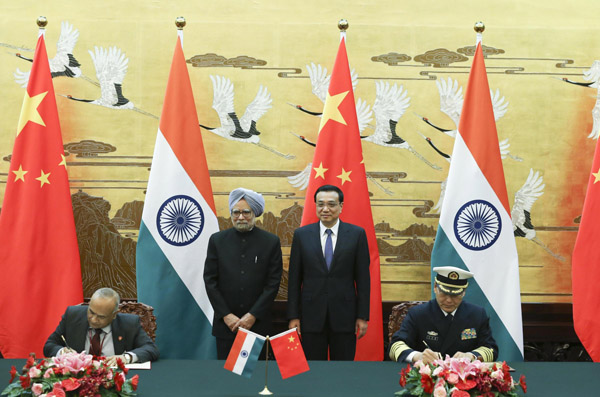 |
|
Premier Li Keqiang (right) and visiting Indian Prime Minister Manmohan Singh attend a media session at the Great Hall of the People in Beijing on Wednesday. [Photo by Wu Zhiyi/China Daily] |
Cooperation agreement will help nations manage disputes
China and India made a major step forward in their ties on Wednesday with an agreement on border defense cooperation and measures to promote regional economic integrity.
After witnessing the signing of the border agreement with his Indian counterpart Manmohan Singh, Premier Li Keqiang said at a news conference that they believe "the two countries have more common interests than disagreements".
The two countries have the ability to manage border disputes, Li said.
Singh said the agreement "will add to the existing instruments to ensure peace, stability and predictability on our borders".
Qu Xing, president of the China Institute of International Studies, said the agreement is a "landmark" legal document to regulate the behavior of both sides and will help eliminate potential misunderstanding and misjudgment.
Beijing and New Delhi have successfully put the border situation under control and properly handled the latest ups and downs, Qu said.
China and India held the fourth round of a consultation and coordination meeting on border affairs in Beijing late last month.
Meeting Singh on Wednesday, President Xi Jinping told him that they should further manage disputes so that the China-India relationship would "correspond to the revitalization process of the two countries".
Hu Shisheng, director of the Institute of South and Southeast Asian and Oceanian Studies at the China Institutes of Contemporary International Relations, said, "Both governments have a strong consensus in ensuring the tranquility of the border, and leaders of both sides are also clear that they want to eliminate disturbance from sensational media reports about the border issues."
A memorandum of understanding on strengthening cooperation on cross-border rivers was also signed.
China will enhance cooperation with India on infrastructure construction, including railways, to push forward the development of the BCIM Economic Corridor, involving Bangladesh, China, India and Myanmar.
"The first meeting of the working groups from the four countries will be held in December" to study the detailed plans of constructing the economic corridor, according to a statement released after the meeting.
Beijing and New Delhi have set up working groups and the Chinese group visited India this month.
"The project will be a defining factor of the following decade," Hu said, adding that the two countries, as the important poles of the mega-project, should take advantage of the economic corridor.
China and India also agreed to study the potential for a bilateral regional trade arrangement, and said a bilateral strategic and economic dialogue will be held in November or December.
Liu Xiaoxue, an expert on Indian economic studies at the Chinese Academy of Social Sciences, said a greater degree of openness between the two huge emerging economies will help fully tap potential.
"China and India have a population of 1.3 billion and 1.2 billion respectively, and if they fully open their markets to each other, we will both survive," Liu said.
The leaders also discussed the construction of a Chinese industrial park in India to ease the trade imbalance.
India should accelerate infrastructure construction to "help attract investors, especially the world's leading manufacturers", Liu said.
This will help eliminate India's huge trade deficit against China, Liu said.
Singh arrived in Beijing on Tuesday night for a three-day visit.
The Indian prime minister will deliver a speech at the Party School of the Central Committee of the Communist Party of China on Thursday.
Contact the writers at zhangyunbi@chinadaily.com.cn and lixiaokun@chinadaily.com.cn
|
|
|
|
|
|
|
|